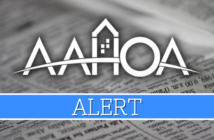Source: Hotel Management
By: Cecil P. Staton
April 29, 2020
Like many small businesses across the country, hotel owners are faced with difficult choices as the impact of COVID-19 ravages the economy. Unemployment shot up to its highest point in decades as governments effectively shut down nonessential businesses. But while layoffs and furloughs are grabbing the headlines, a silent job killer with long-term implications for the hospitality sector and the broader economy looms, and Congress and the Trump administration must act.
Books and movies like “The Big Short” and “Too Big to Fail” about the 2008 financial crisis familiarized millions of people with the concept of mortgage-backed securities. Residential mortgages were sliced up and packed into tranches and sold off as securities. It seemed foolproof, right? Who wouldn’t pay the mortgage on their house? Well, we all know how that ended. The toxic assets bundled into mortgage-backed securities brought our entire financial system to the precipice. Only our federal government’s intervention kept the entire thing from crashing down. Remember this last part because it is key to resolving the looming crisis facing the hotel industry.
Hotel owners face a similar crisis today but through no fault of their own. The precipitous drop of occupancy rates and revenues because of COVID-19 left many hotel owners struggling to meet payroll and pay their mortgages. While the Paycheck Protection Program offers some relief on the employee side of things, it does virtually nothing to help small-business owners pay commercial mortgages. Fortunately, many hotel owners with traditional loans are working with their lenders directly to seek forbearance or otherwise negotiate terms. However, owners trying to stay current on or renegotiate commercial mortgage-backed security loans face a series of obstacles that could not only end up killing their businesses but also upend the fixed income market. A series of CMBS loan defaults would create a significant market disruption that could negatively impact pension plans and other consumer-facing investment vehicles.




